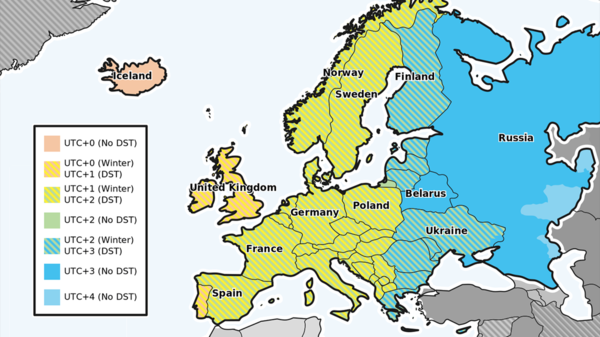End of DST in Europe 2019
On Sunday, October 27, 2019, clocks will be set back 1 hour in most of Europe as Daylight Saving Time (DST) ends.
Current information on on the European Parliament's process to remove DST permanently in the EU


Areas in Europe with and without DST.
©timeanddate.com
When Do Clocks Change in Europe?
Clocks in most European countries are turned back by 1 hour on October 27, 2019 at 01:00 UTC. Since Europe spans several time zones, the switch occurs at different local times (see table below).
DST in Europe starts again on Sunday, March 29, 2020.
As always, the US will end DST a week after Europe, on November 3, 2019.
EU Wants to Remove DST Permanently
On March 26, 2019, the European Parliament voted in favor of removing Daylight Saving Time (DST) permanently. If the law comes into effect, 2021 may be the last time EU Member States and affiliated countries follow the seasonal clock change.
Each Member State has until April 2020 to decide whether to remain permanently on “summer time” (DST) or to change their clocks back one final time to permanent standard time, also known as “winter time.”
For this reason, all subsequent clock changes in European countries are marked as preliminary on timeanddate.com.
Time Change in Europe
Time changes in Europe are synchronized. According to the current EU rules, DST starts on the last Sunday of March and ends on the last Sunday of October. Participating countries are:
- The European Union (EU), including the United Kingdom, France, Germany, Spain, Italy, Poland, and Bulgaria.
- Most other European countries, including Norway and Switzerland.
Upcoming DST changes worldwide
No DST in Russia
Russia does not use DST. Other European countries that don't use DST include Iceland, Belarus, Georgia, and Armenia.
DST End: European Local Times
| Time Zone during DST | Local Time of DST End | Time Zone after DST (standard time) |
|---|---|---|
British Summer Time (BST) used in the UK and Ireland during summer UTC offset: +1 hour |
DST ends at 02:00 (2 am) local time. |
UTC offset: None |
Western European Summer Time (WEST) observed in Portugal, the Faroe Islands, and the Canary Islands. UTC offset: +1 hour |
DST ends at 02:00 (2 am) local time. Clocks are set back 1 hour to 01:00 (1 am). |
UTC offset: None |
Central European Summer Time (CEST), used in countries including France, Germany, Austria, Italy, Switzerland, Norway, Poland, Hungary, and Spain. UTC offset: +2 hours |
DST ends at 03:00 (3 am) local time when clocks are set back 1 hour to 02:00 (2 am). |
UTC offset: +1 hour |
Eastern European Summer Time (EEST), observed in countries including Bulgaria, Estonia, Finland, Greece, Latvia, Romania, and most areas in Ukraine. UTC offset: +3 hours |
DST ends at 04:00 (4 am) local time when clocks are set back 1 hour to 03:00 (3 am). |
UTC offset: +2 hours |
Most of the western parts of Russia and some parts of Ukraine are in the Moscow time zone, Moscow Standard Time (MSK). UTC offset: UTC +3 hours |